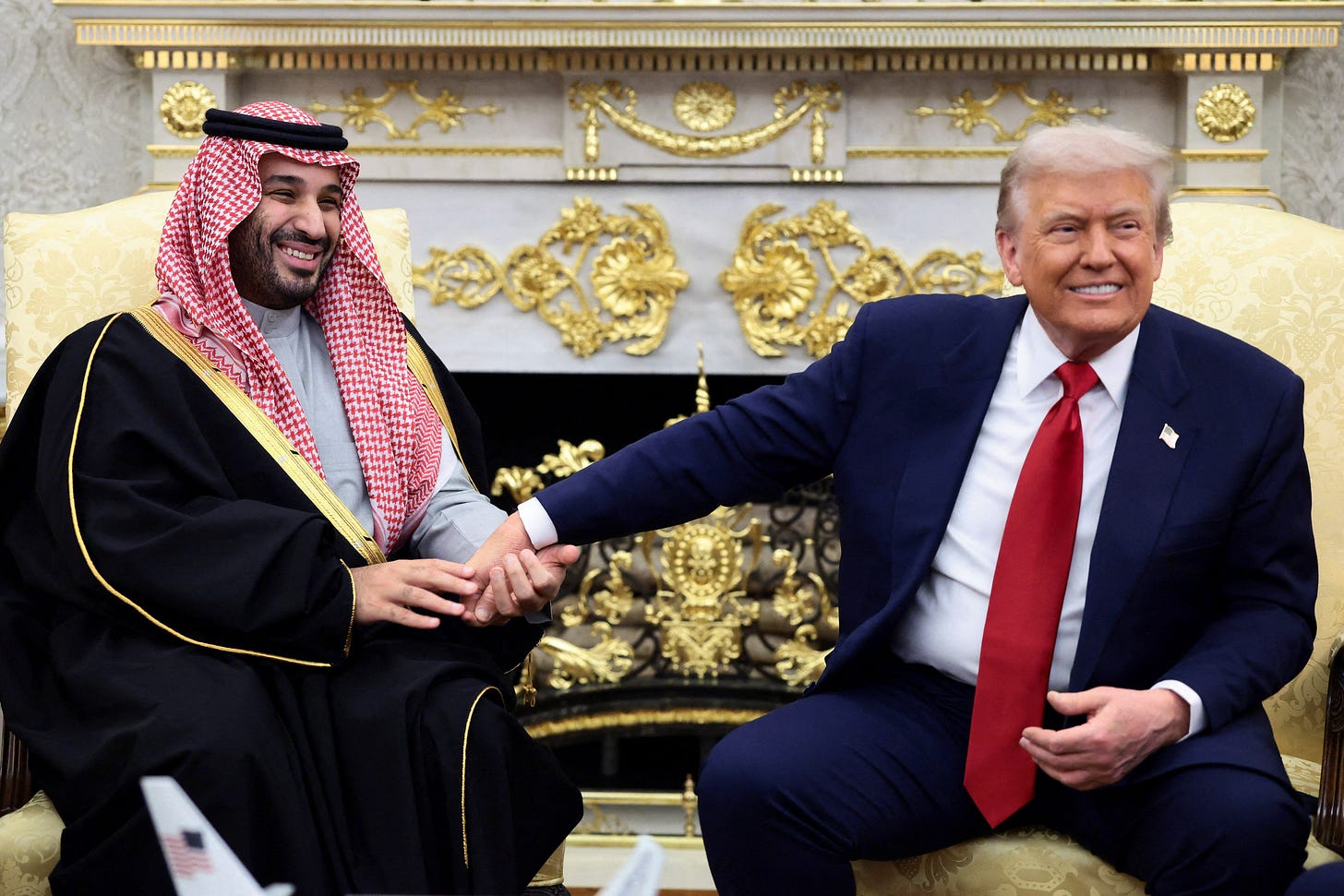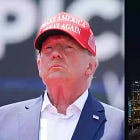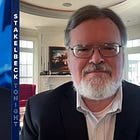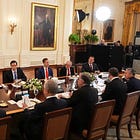The Trump-MBS Summit: Another Huge Trump Foreign Policy Win
A former National Security Council Chief of Staff on the reset in U.S.-Saudi ties, pairing strategic military deals with economic investment to counter growing Russian and Chinese influence.
This essay is free, but with Premium Membership you get MORE. Join today.
NOTE: My friend Fred Fleitz is a former Trump National Security Council Chief of Staff, a former CIA analyst, and a former senior staffer with the House Intelligence Committee. His insight on this topic is better than most.
Saudi Arabia is a country with which we disagree on many things. But that certainly does not mean we can’t get along and do business together. And indeed, the Kingdom is essential to President Trump’s vision for peace in the Middle East. The Abraham Accords would have been impossible without it: though it did not immediately join itself, it blessed the deal and gave the go-ahead to those who did. Its tacit but growing alliance with Israel is essential to securing the region from Iran and its proxies, and perhaps to Gaza reconstruction. And as a counterweight to Turkey in Syria, it moderates the new regime in Damascus while containing the one in Ankara (which likewise counterbalances both Tehran and Riyadh).
Such balances of power are the stuff of which peace is made. It’s a bit too realpolitik for the Beltway crowd, which prefers lectures and invasions. But how have their lectures and invasions worked out? — RDM
by Fred Fleitz
November 22, 2025
President Trump gave Saudi Crown Prince and de facto ruler Mohamed bin Salman an extravagant greeting when he visited the White House on Tuesday, reflecting the president’s respect for the Saudi leader and his belief that a strong U.S.-Saudi relationship is crucial to American and global security.
Trump’s warm reception of the Crown Prince was also part of his efforts to reverse the damage done to the U.S.-Saudi relationship by Joe Biden.
An honor guard of mounted troops from the Army’s 3rd Infantry Division (the Old Guard) escorted the prince’s limo onto the White House grounds. There was a Marine band and a 21-gun salute. After Trump greeted the prince in front of the diplomatic entrance, F-16 and F-35 fighter jets did a dramatic flyover of the White House.
But much more important than this pomp and ceremony, President Trump announced that Saudi Arabia will be designated a major U.S. non-NATO ally and that he will sell F-35 stealth fighter jets to the kingdom.
Crown Prince Mohamed bin Salman (also known as MBS) has modernized and reformed his country as he remakes the kingdom into a powerful geopolitical player. At home, MBS’s “Saudi First” policies have led to investments of hundreds of billions of dollars to develop new industries and open the long-isolated nation to international business and tourism.
In 2017, President Trump saw MBS as a reformer and a critical U.S. ally, which is why he made his first state visit to Saudi Arabia. The president did this again in his second term when he visited the kingdom last May. MBS was a close ally throughout the first Trump term. Although MBS did not join the Abraham Accords during this period, his support for the agreement and his efforts to informally normalize Saudi relations with Israel helped bring about this historic agreement.
There appeared to be progress during the Trump/MBS meeting on Saudi Arabia joining the Abraham Accords. MBS said he wants his country to join the accords but seeks to secure “a clear path to a two-state solution.”
Although some observers interpreted this comment as indicating that the crown prince was putting off a decision to join the agreement, I believe MBS was saying he is ready to enter the agreement with a plan — but not a guarantee — for a Palestinian state. I also think Trump’s decision to sell F-35s to Saudi Arabia will be a powerful incentive for MBS to join the accords.
The visit should also be a boon to the U.S. and Saudi economies. MBS agreed to invest up to $1 trillion in the U.S. during the visit. Tesla CEO Elon Musk and Nvidia CEO Jensen Huang met with MBS to discuss U.S.-Saudi technology cooperation, including the prince’s ambitious plan to make his country an AI superpower. The president also hosted a U.S.-Saudi investment forum at the Kennedy Center on Wednesday.
President Trump’s embrace of MBS reflects his belief that the serious damage done to U.S.-Saudi relations by President Biden’s hostility toward the country undermined U.S. security and created a power vacuum that Russia and China exploited.
China and Russia worked hard during the Biden administration to exploit the decline in U.S.-Saudi relations. Russia and Saudi Arabia signed an oil production agreement in June 2021 and military cooperation agreements in February and August of that year. Saudi Arabia signed a deal to abandon U.S. dollar transactions for some oil sales to China and switch them to China’s currency, the yuan. China even brokered a 2023 agreement to restore diplomatic relations between Saudi Arabia and its overt enemy Iran.
Biden’s hostility toward MBS and Saudi Arabia mainly stemmed from the 2018 killing of Saudi Arabian journalist Jamal Khashoggi in the Saudi consulate in Istanbul. I don’t dispute that Khashoggi’s killing was an outrage, but both the Trump and the Biden administrations confronted Saudi Arabia about this. The Biden administration released intelligence on this matter in February 2021 and sanctioned and issued travel bans against Saudi citizens in response to Khashoggi’s killing. Biden, however, kept raising this issue, including during his awkward 2022 visit to Saudi Arabia when MBS spurned Biden’s request for Saudi Arabia to increase oil production ahead of the 2022 midterm election.
The mainstream media still refuses to give up the Khashoggi issue because it sees it as a way to undermine President Trump. That’s why ABC reporter Mary Bruce made a spectacle of herself at the Trump-MBS press conference on Tuesday when she asked angry questions, blaming MBS for the Khashoggi killing and making the groundless claim that 9/11 survivor families were angry he was visiting the White House because the 9/11 terrorists were Saudi citizens.
Naturally, other liberal reporters defended Bruce’s “courage” for asking her biased questions at the press conference. None of them mentioned Bruce’s record as a Democrat partisan, including when she submitted questions for a press conference with President Biden in advance, or when she said that a March 2024 report by Special Counsel Robert Hur indicated that Biden was mentally sharp and not “an elderly man with a bad memory,” as Hur said in his report.
President Trump sharply rebuked Bruce for her politicized questions. But this incident had a bright side: MBS came prepared to handle hostile questions and did so well. This was a positive sign reflecting the Crown Prince’s efforts to modernize and open up Saudi Arabia.
Crown Prince Mohamed bin Salman’s visit to the White House was another critical success for President Trump’s second-term foreign policy. The stronger relationship Trump is building with Saudi Arabia will promote stability in the Middle East, reap huge economic benefits for the U.S., and encourage MBS’s modernization efforts. Most importantly, this closer relationship will help head off efforts by Russia and China to replace American influence and leadership in the Middle East.
— Fred Fleitz is a former CIA analyst and staff member with the House Intelligence Committee. In 2018, he served as the National Security Council Chief of Staff and as a Deputy Special Assistant to President Trump.










👏👏👏 Thank you, Fred Fleitz and Dr. Martin for this excellent article on why Saudi Arabia is a crucial ally for us in the Middle East and why this is a huge coup for Donald Trump and MBS! I don’t care for Crown Prince Mohamed Bin Salman as a person, but I must applaud what he has done in reforming and modernizing the kingdom and bringing it into the 21st Century. He truly is the Middle Eastern version of Deng Xiaoping. I don’t care for Saudi Arabia’s government and I am deeply concerned by their horrible human rights record. But I support our alliance with them 100% because they have invested billions in America that will create jobs, put people to work and strengthen our economy, they share important intelligence with us and they are a huge counterweight to Iran. They also help moderate Ahmed al-Sharaa’s regime in Syria as a counterweight to the other great enemy power in the Middle East, Turkey. Not to mention they are friendly towards Israel.
A normalization deal with Saudi Arabia and Israel should be immediately completed once the war is over! Israel should agree to a plan for a Palestinian state as Saudi Arabia wishes but none should be created anytime soon. Why would a two-state solution be a bad idea right now? Let me count the ways! For one thing it would either a kleptocratic dictatorship under Mahmoud Abbas or an Islamic theocracy under Hamas. It would be haven for every terrorist group on the planet. Regular Palestinians would have zero rights or freedoms. Women would be treated as chattel. LGBTQ+ people would be executed. Jews would be banned from being citizens. Christians and black people would have systemic discrimination. Open slavery would be practiced. Dowries, honor killings, child marriage, female genital mutilation, animal sacrifices, acid attacks, and the wearing of the full burqa would be commonplace. Disabled people would be abused, neglected and shut away in institutions.
It would be a close ally of not only Iran and Turkey and Russia, China, North Korea, and all the despots and terrorist groups of the world. It would an economic basket case that could barely function with high levels of unemployment, poverty, food insecurity, inflation, and crime. Not to mention organized crime and criminal gangs would be running around causing havoc and dealing drugs freely on the open market. Plus it would be a huge national security threat to Israel, the moderate Arab regimes, the United States, and the West. It is most wise of the Saudis not to insist on actually implementing a Palestinian state. The two-state solution for the time being is dead. Saudi Arabia should receive those F-35 fighter jets so they have as strong a military as possible when going up against the Iranians and the Turks. Joe Biden insulted the Saudis and pushed them into Russia and China’s arms. Donald Trump reconciled with them and brought them back into the fold. That’s a huge win for him and the country as a whole on foreign policy!
Jamal Khashoggi’s murder was horrific and MBS and his regime are 100% guilty of having committed it. But as tragic as his death was, we can’t let that interfere with an alliance that will be for the greater good of all in the Middle East and save millions of lives and create hundreds of thousands of jobs. ABC’s Mary Bruce asking nasty, partisan questions and trying to undermine all that Trump has worked for was horrible! The mainstream media interestingly neglected to talk about her history of being an open left-winger. Her bringing up Khashoggi’s death and making up a story that the 9/11 families were unhappy with Trump’s alliance Saudi Arabia due to the 9/11 hijackers coming from there, was disgusting. She deserved to be called piggy. Mary Bruce was no innocent victim and that’s a fact. Funny how the mainstream media provided no context about that. I wonder why that could’ve been?
Thank you...I vote for a deal that does not include a 2 state solution and no F-35s.